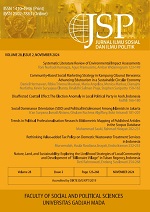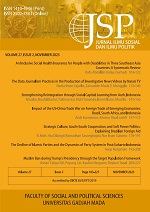The Political Process of Bureaucratic Reform: Wonosobo Regional Government Experience from 2011-2015
I Made Krisnajaya(1*), Suripto Suripto(2), Novi Paramita Dewi(3), Ambar Teguh Sulistiyani(4), Lutfi Untung Angga Laksana(5)
(1) Department of Public Policy and Management, Faculty of Social and Political Sciences, Universitas Gadjah Mada
(2) Department of Public Policy and Management, Faculty of Social and Political Sciences, Universitas Gadjah Mada
(3) Department of Public Policy and Management, Faculty of Social and Political Sciences, Universitas Gadjah Mada
(4) Department of Public Policy and Management, Faculty of Social and Political Sciences, Universitas Gadjah Mada
(5) Department of Public Policy and Management, Faculty of Social and Political Sciences, Universitas Gadjah Mada
(*) Corresponding Author
Abstract
This study examines the political process of bureaucratic reform in Wonosobo regional government from 2011-2015. The article uses political and bureaucratic frameworks to describe the interplay of bureaucrats and politicians in the phases of bureaucratic reform. Data collection for this study employed document review and in-depth interviews with key informants. Results of the study show that the political process of bureaucratic reform mainly involved dialectical interactions between actors in the Wonosobo Regional Government and the Regional House of Representatives. The interplay of actors can then be explained through the actors’ configuration, issues that are confronted by the actors, conflicts of interest between actors, and influence tactics used by actors in managing issues and struggling for their interests. The experience of the Wonosobo regional government shows that bureaucratic reform does not only concern technical and administrative capacities in carrying out institutional arrangement, but it also involves political aspects namely visionary leadership, strong political will to conduct reform, and effective use of influential tactics to gain political supports for the reform.
Keywords
Full Text:
PDFReferences
Aberbach, J. D., & Rockman, B. A. (2006). The past and future of political-administrative relations: Research from bureaucrats and politicians to in the web of politics—and beyond. International Journal of Public Administration, 29(12), 977-995. doi: 10.1080/01900690600854589
Anderson, A. H. & Kyprianou, A. (1994). Effective Organizational Behaviour: A Skills and Activity-Based Approach. Oxford: Blackwell Publishers.
Alexander, D., Lewis, J. M. & Considine, M. (2011). How politicians and bureaucrats network: A comparison across governments. Public Administration, 89(4), 1274-1292. doi: 10.1111/j.1467-9299.2010.01890.x
Berenschot, W. (2018). Incumbent bureaucrats: Why elections undermine civil service reform in Indonesia. Public Administration & Development, 38(4), 135-143. doi: 10.1002/pad.1838
Bowornwathana, B., & Poocharoen, O. (2010). Bureaucratic politics and administrative reform: Why politics matters. Public Organization Review, 10(4), 303-321. doi: 10.1007/s11115-010-0129-0
Boyd, N. M. (2009). Administrative reform in the States. Public Administration Quarterly, 33(2), 155-163.
Brinkerhoff, D. W., & Crosby, B. L. (2002). Managing policy reform: Concepts and tools for decision-makers in developing and transitioning countries. Connecticut: Kumarian Press.
Caiden, G. E. (1991). Administrative reform comes of age. New York: deGruyter.
Crawford, P. J. (1996). The serious business of governing: Reform in government & transformation in the public sector. New South Wales: Southwood Press.
Dasandi, N., & Esteve, M. (2017). The politics-bureaucracy interface in developing countries. Public Administration & Development, 37(4), 231-245. doi: 10.1002/pad.1793
Dwiyanto, A. (2016). Memimpin perubahan di birokrasi pemerintah: Catatan kritis seorang akademisi. Yogyakarta: Gadjah Mada University Press.
Dwiyanto, A. (2013). Mengembalikan kepercayaan publik melalui reformasi birokrasi. Jakarta: Gramedia Pustaka Utama.
Enikolopov, R. (2014). Politicians, bureaucrats and targeted redistribution. Journal of Public Economics, 120(C), 74-83.
Gains, F. & John, P. (2010). What do bureaucrats like doing? Bureaucratic preferences in response to institutional reform. Public Administration Review, 70(3), 455-463.
Gaus, N., Sultan, S., & Basri, M. (2017). State bureaucracy in Indonesia and its reforms: An overview. International Journal of Public Administration, 40(8), 658–669. doi: 10.1080/01900692.2016.1186179
Government of Wonosobo Regency. (2015, July 23). Hadapi judicial review perda OPD dengan bahagia, Bupati minta semua pejabat tetap bekerja. Retrieved from https://wonosobokab.go.id/website/index.php/berita/seputar-wonosobo/item/3772-hadapi-judicial-review-perda-opd-dengan-bahagia-bupati-minta-semua-pejabat-tetap-bekerja.
Government Regulation of the Republic of Indonesia No. 41/2007 on Regional Government Organization.
Gulzar, S. & Pasquale, B. J. (2017). Politicians, bureaucrats, and development: Evidence from India. The American Political Science Review, 111(1), 162-183.
Howlett, M & Ramesh, M. (1995). Studying public policy: Policy cycles and policy subsystems. Oxford: Oxford University Press.
Johansson, V. (2012). Negotiating bureaucrats. Public Administration, 90(4), 1032-1046. doi: 10.1111/j.1467-9299.2012.02025.x
Kim, S., & Han, C. (2015). Administrative reform in South Korea: New public management and the bureaucracy. International Review of Administrative Sciences, 81(4), 694-712. doi: 10.1177/00200852314558034
Kim, P. S. (2010). Civil service system and civil service reform in ASEAN member countries and Korea. Seoul: Choon Whan Lim Daeyoung Moonhwasa Publishing Company.
Law of the Republic of Indonesia No. 1/2015 On Election of Head of Province and Regency/Municipal.
Liou, K. T & Feldheim, M. A. (2018). Implementing downsizing reforms in county governments. Public Administration Quarterly, 42(1), 32-58.
Miles, M. B., Huberman, M. & Saldana, J. (2014). Qualitative data analysis (3rd ed). London: Sage.
Peters, B. G. (2001). The future of governing (2nd ed). Kansas: University Press of Kansas.
Peters, B. G & Pierre, J. (2001). Politicians, bureaucrats and administrative reform. London: Routledge.
Pierre, J & Peters, B. G. (2000). Governance, politics and the state. London: MacMillan Press.
Pratiwi, L. N. (2013). Resistensi dan akseptabilitas pegawai terhadap rencana restrukturisasi organisasi perangkat daerah di Kabupaten Wonosobo. Yogyakarta: Departemen Manajemen dan Kebijakan Publik, Fakultas Ilmu Sosial dan Ilmu Politik, Universitas Gadjah Mada.
Purwanto, E. A., Pramusinto, A., Kumorotomo, W., Widaningrum, A., Subarsono, A., & Apriliyanti, I. D. (2015). Menggagas peta jalan reformasi birokrasi. Yogyakarta: Gadjah Mada University Press.
Tujuh PNS gugat perda OPD. (2015, June). Radar Kedu. Retrieved from https://www.radarkedu.com/2015/06/18/tujuh-pns-gugat-perda-opd.
Jumlah Dinas dari 14 Menjadi 7. (2014, January 7). Jawa Pos. Retrieved from http://radarsemarang.com/2014/01/04/jumlah-dinas-dari-14-menjadi-7/.
Regent of Wonosobo Decree No. 821.2/055/BKD/2015 on Appointment, Mutation, and Termination of Structural Officials of Wonosobo Regional Government.
Regional Regulation of Wonosobo Regency No. 3/2014 on Regional Government Organizations of Wonosobo Regency.
Ricks, J. I. (2018). Agents, principals, or something in between? Bureaucrats and policy control in Thailand. Journal of East Asian Studies, 8(3), 321-344. doi: 10.1017/jea.2018.17
Santhitiwanich, A., & Bowornwathana, B. (2014). Political strategy of senior bureaucrats in structural expansion in Thailand. International Journal of Humanities and Social Science, 4(5), 182-189.
Sulistiyani, A. T., Susiawati, M., & Purwanti, N. D. (2014). Teori dan implementasi birokrasi organisasi: Agenda penataan organisasi perangkat daerah Kabupaten Wonosobo. Sleman: Independent Generation.
Tight, W. (2010). The curious case of case study: A viewpoint. International Journal of Social Research Methodology, 13(4), 329–339. doi: 10.1080/13645570903187181
Wihantoro, Y., Lowe, A., Cooper, S. & Manochin, M. (2015). Bureaucratic reform in post-Asian crisis Indonesia: The directorate general of tax. Critical Perspectives on Accounting, 31, 44-63. doi: 10.1016/j.cpa.2015.04.002
Article Metrics
Refbacks
- There are currently no refbacks.
Copyright (c) 2019 Jurnal Ilmu Sosial dan Ilmu Politik

This work is licensed under a Creative Commons Attribution-NonCommercial-NoDerivatives 4.0 International License.























